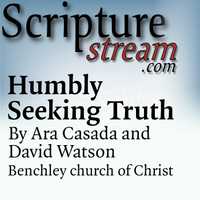-
Attitude check: Galatians 1:6-7; 4:16 – When we disagree, the point is to unify on truth.
-
Why don’t you call your preacher the “Pastor?” (continued)
-
Three Greek words are used in the New Testament to refer to the men who are appointed as leaders and watch over the souls in a local church.
-
Presbuteros – elder, presbyter
-
Episkopos – overseer, bishop
-
Poimen – pastor, shepherd
-
-
How do we know these words all refer to the same man?
- Acts 20:17, 28; I Peter 5:1-2 – These passages use the terms interchangeably.
-
Don’t preachers feed the flock, thus making them pastors/shepherds?
-
Yes, they do, but so do other people: song leaders, scripture readers, those who bring short lessons, etc.
-
The Bible makes a distinction between anyone who feeds the flock and those who are specifically designated with special responsibilities. I Timothy 3; Titus 1
-
-
Why this matters
-
We don’t want to imply that preachers have some unauthorized role or authority within a congregation.
-
We don’t want to rob elders of their proper role and authority.
-
-
-
How do I know when the Holy Spirit is talking to me?
-
Don’t take Jesus’ promises to the apostles as promises to us.
-
Jesus made several promises about the Holy Spirit to the apostles. Those promises are often quoted today as if Jesus was making promises to all people for all time.
-
John 13-17 – Jesus was speaking with His apostles.
-
“You”: apostles, not all believers everywhere for all time
-
John 14:16-17, 25-26 – Holy Spirit would teach and inspire perfect memories.
-
-
Jesus prayed with and for the apostles in John 17 and then that’s the end of the section (John 18:1).
-
-
These promises to the apostles began to be fulfilled in Acts 1-2.
-
Acts 1:1-8 – Jesus gave orders to the apostles.
-
Acts 1:14-15 – Other people mentioned, but subject returns to the apostles in Acts 1:26.
-
Only the apostles were speaking in tongues in Acts 2.
-
-
We might wonder if the phrase in Acts 2:38 (“the gift of the Holy Spirit”) means that all people receive some supernatural communication or power from the Spirit.
- Numerous examples show that baptism and receiving the Holy Spirit in a miraculous way were two separate things. Acts 8:16-18; 10:44-48; 19:1-7
-
DW
January 13, 2019
For further study, see also:
Questions or comments? Join our Discord server for further study.
